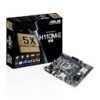Asus H110M-E/M.2 H110M-E/M.2 Users manualEnglish - Page 14
Audio 2.1
 |
View all Asus H110M-E/M.2 manuals
Add to My Manuals
Save this manual to your list of manuals |
Page 14 highlights
Audio 2.1, 4.1, 5.1, or 7.1-channel configuration Port Light Blue (Rear panel) Lime (Rear panel) Pink (Rear panel) Lime (Front panel) Headset 2.1-channel 4.1-channel 5.1-channel 7.1-channel Line In Rear Speaker Out Rear Speaker Out Rear Speaker Out Line Out Mic In - Front Speaker Out Mic In - Front Speaker Out Bass/Center - Front Speaker Out Bass/Center Side Speaker Out To configure a 7.1-channel audio output: Use a chassis with HD audio module in the front panel to support a 7.1-channel audio output. 7. USB 2.0 ports. These 4-pin Universal Serial Bus (USB) ports are for USB 2.0/1.1 devices. 8. USB 3.0 ports. These 9-pin Universal Serial Bus (USB) ports are for USB 3.0/2.0 devices. Due to the design of the Intel® 100 series chipset, all USB devices connected to the USB 2.0 and USB 3.0 ports are controlled by the xHCI controller. Some legacy USB devices must update their firmware for better compatibility. 9. HDMI port. This port is for a High-Definition Multimedia Interface (HDMI) connector, and is HDCP compliant allowing playback of HD DVD, Blu-Ray, and other protected content. 10. PS/2 keyboard port (purple). This port is for a PS/2 keyboard. 1-6 Chapter 1: Product introduction















